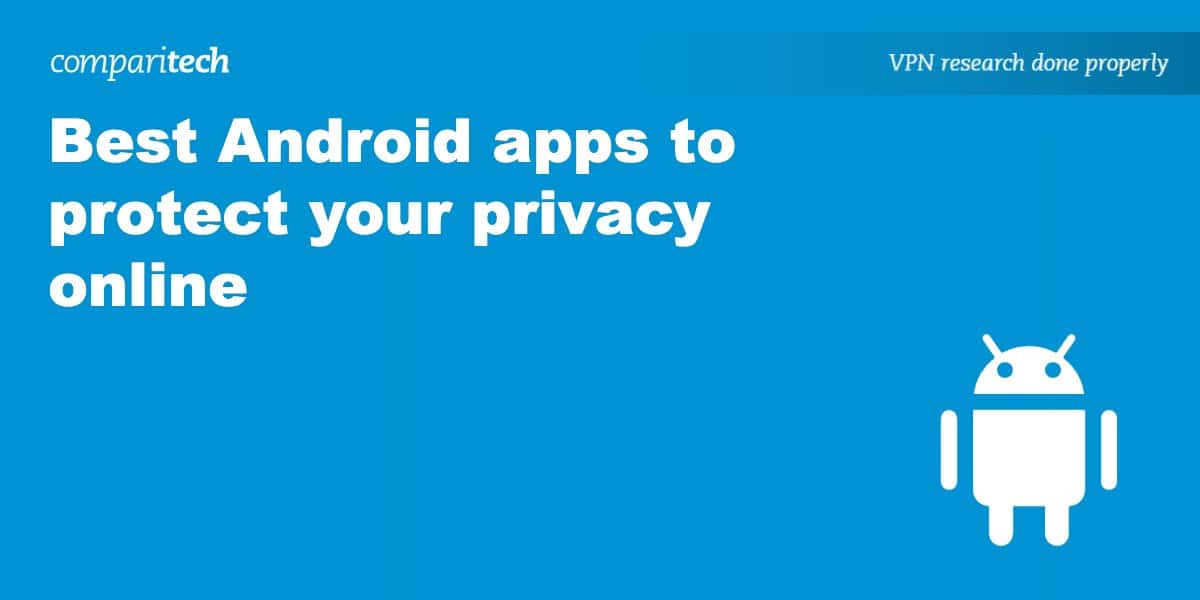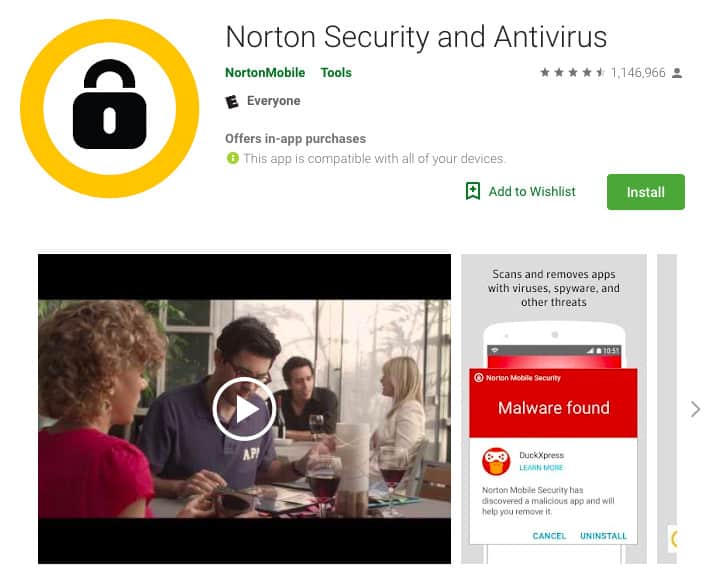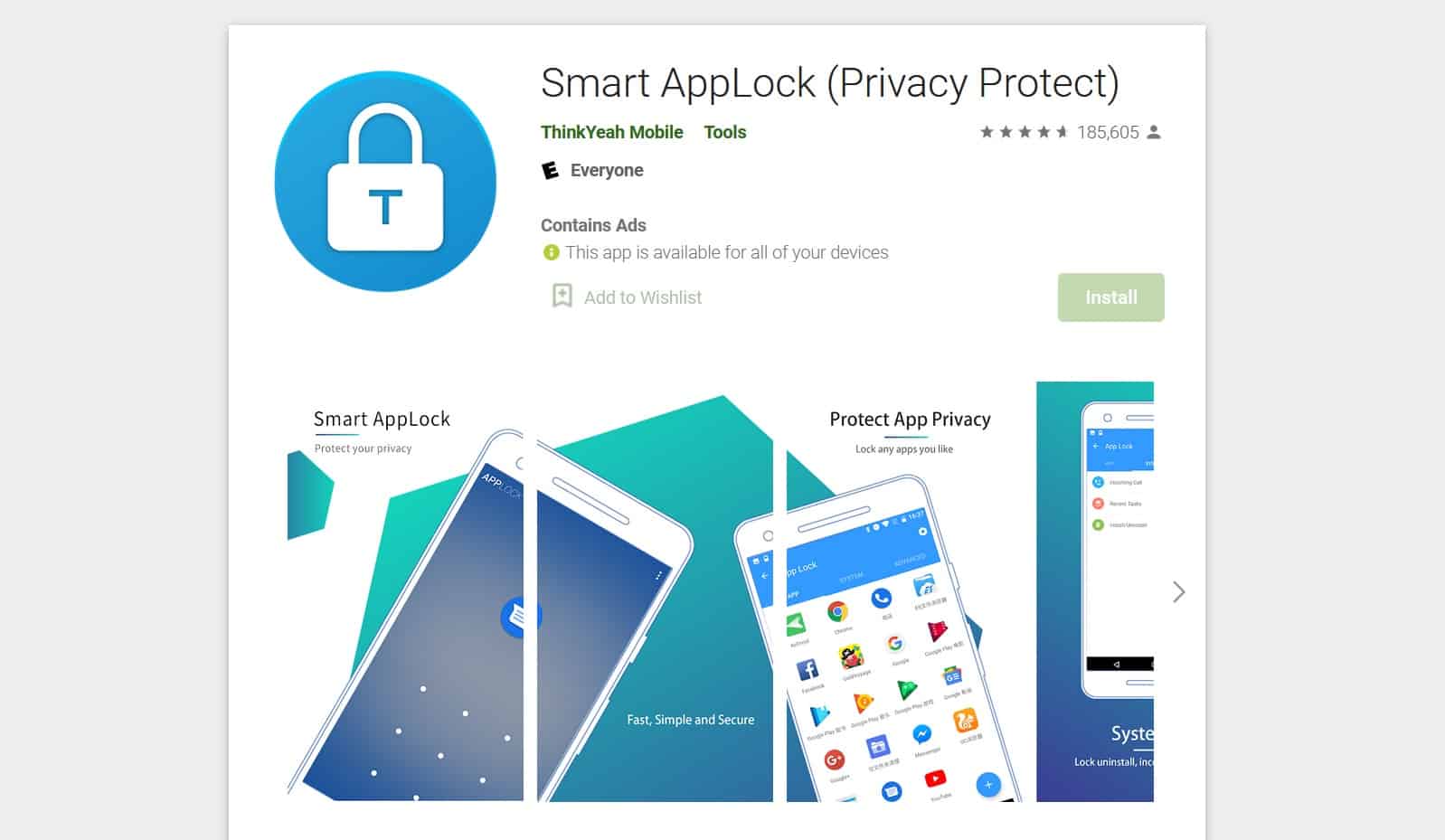It’s common practice to take steps to protect your desktop PC with antivirus, VPNs, adblockers, and similar apps. But fewer people have the same consideration for their mobile Android devices too.
There a tons of security and privacy-focused apps available on the Google Play store that can help shield your mobile device from online threats and snoopers. Admittedly, not all of these apps are made equal. Some work very well, while others can just make things worse, which is why we’ve put this guide together.
Our team of experts has tested dozens of privacy apps and secure browsing tools to see which are worth using and which are best avoided. Below we look at the best privacy and security apps for your Android device to help take your online privacy and security to the next level.
The best security apps to protect your Android device
- NordVPN – The best VPN app for Android. This app will encrypt your internet traffic and prevent snoopers, ISPs, and governments from monitoring you online. It’s also useful for unblocking geo-restricted content.
- Proton Mail – The best secure email app on Android. An encrypted email servicer with some other useful features like self-destructing emails.
- Signal – The best app for private messaging on Android. This messaging app offers end-to-end encryption to ensure anything you send stays between you and the recipient.
- Hushed – The best Android app for a temporary number. You can use this app to create yourself a temporary phone number when making calls.
- DuckDuckGo – The best private search engine app for Android users. It’s like Google but doesn’t collect and store your information.
- IPVanish – The best way to protect low-resource devices like Amazon Fire Sticks. Delivers impressive speeds, blocks ads automatically, and provides 24/7 support over live chat.
- LastPass – The best secure password manager for Android. If you’re always making secure passwords and then forgetting them, this is the app for you.
- Find My Device – The best phone locator app for Android. This app gives you peace of mind that if you lose your phone you can geo-locate it and even stop anyone accessing your data remotely with this app.
- Norton Antivirus – The best anti-virus app for Android devices. There a loads of antivirus Android apps on the Play Store, but we’ve tested them and this is the best.
- Smart AppLock – The best permissions manager Android app. This app lets you micro-manage the permissions of the apps on your phone the keep everything locked down.
Best Android apps for online privacy
Here’s our list of the best Android apps to protect your privacy online:
1. NordVPN
Apps Available:
- PC
- Mac
- IOS
- Android
- Linux
- FireTV
Website: www.NordVPN.com
Money-back guarantee: 30 DAYS
If you’re not browsing the web with a Virtual Private Network (VPN) installed, now’s a good time to get with the program. There are countless free VPNs out there, but this is one area where it really is worth going for a reputable paid service.
VPNs work by encrypting all the traffic flowing to and from your device and sending it through a server in another location. This hides your anyone who might be watching, including your service provider, government, or network administrator.
VPNs have other advantages, too; they can help you torrent safely, regain access to geo-restricted content such as Disney+, Hulu, and ESPN while traveling abroad, and improve your anonymity while using the Tor Browser.
NordVPN makes the cut due to its powerful security features, robust speeds, and vast server network. What’s more, it’s optimized for mobile devices, so it won’t have a huge impact on your battery life. Unlike most free VPNs, this service follows a true no-logs policy, meaning it can’t share details of your online activity under any circumstances. Further, it comes with a 30-day money-back guarantee so you can try it risk-free.
BEST VPN FOR ANDROID PRIVACY:NordVPN is our #1 choice. With a vast server network that is optimized for high-speed connections, it’s perfect for secure browsing on Android devices. Lots of top-tier security features. A 30-day money-back guarantee means you can try it risk-free.
Read our full review of NordVPN.
2. Proton Mail
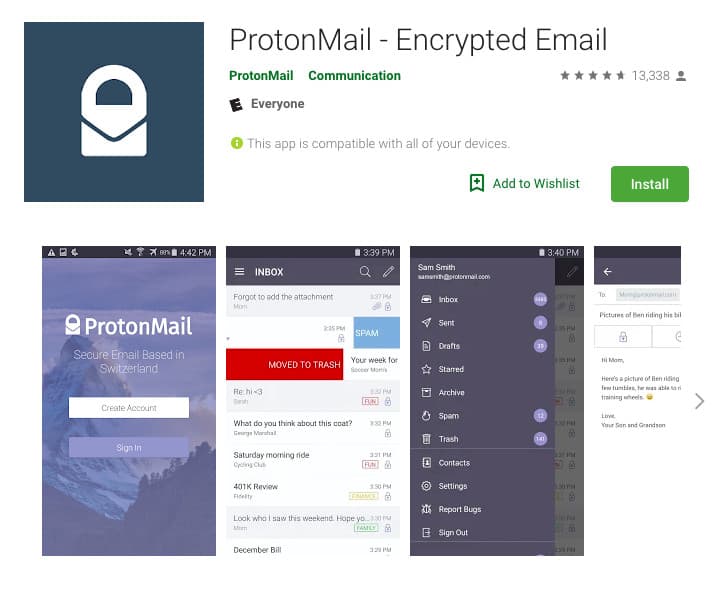
Proton Mail is a far more secure alternative to Gmail and its peers. It was engineered by scientists at CERN and remains open source so that its code can be audited whenever needed. This organization also has its own Google Drive alternative, password manager, and VPN, all of which work on mobile devices.
The app enables you to send password-protected emails and messages that self-destruct after a certain timeframe. Since all messages are encrypted, even the company cannot figure out the content of your communications.
Download Proton Mail for Android phones.
3. Signal Private Messenger
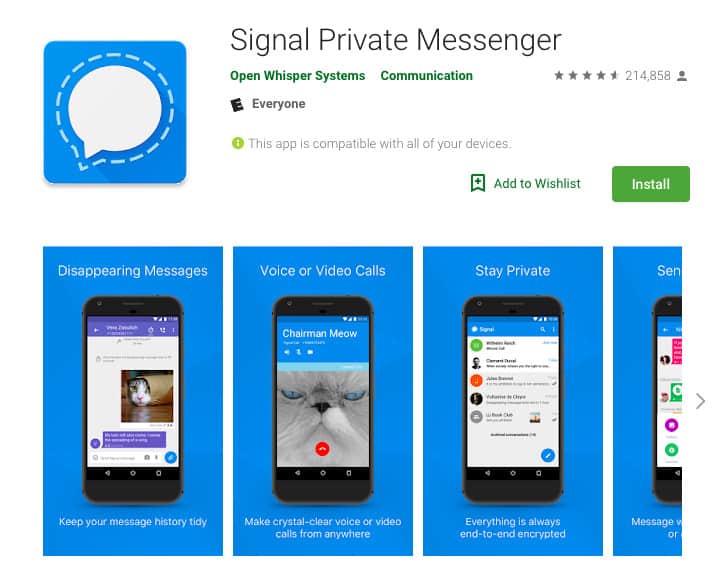
Signal Private Messenger is a messaging service with a strong focus on privacy. With open-source code and end-to-end encryption for all messages, it has become a favorite of journalists and activists around the world. Additionally, because it’s open-source, it’s possible for anyone to verify its security by auditing the code.
In addition to using peer-reviewed cryptographic protocols, Signal keeps your information safe by storing no logs. There’s no retention of metadata, such as lists of members, group icons, or names. These are all examples of data that may be tracked by other messaging apps.
Download Signal from the Google Play Store.
4. Hushed
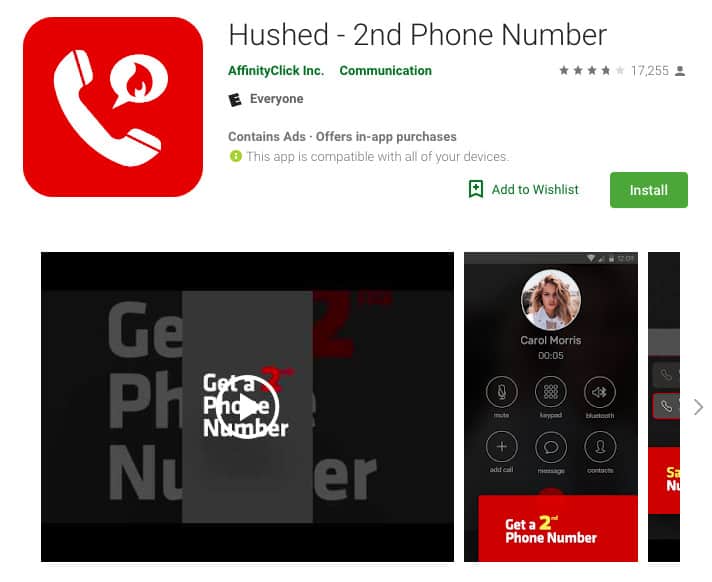
Hushed enables you to create burner (temporary) phone numbers, so your real one remains hidden. It’s perfect for when you’re posting an advertisement on Craigslist or filling out a web form. It can also be handy for creating alternate caller IDs, managing multiple lines for personal and business use, and eliminating the need to carry a second phone.
Hushed currently offers a three-day free trial, and you can pay via Google Play, so there’s no need to provide credit card details.
Download Hushed for Android devices.
5. DuckDuckGo
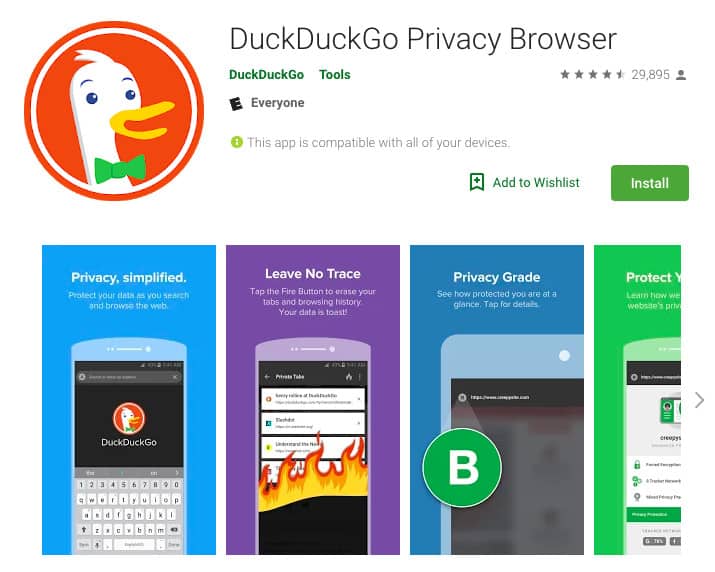
DuckDuckGo is a private search engine that stores no data and goes out of its way to limit the information that websites or apps can collect about you. Its built-in security features block advertising networks from tracking you to the effect that you’re essentially tracking who’s trying to track you. It also tries to compel sites to use an encrypted connection whenever available, although we maintain that a VPN should be your first resource in that area.
If you like DuckDuckGo, you might be interested to learn that it just launched its own browser for desktop systems, which includes a password manager.
Download DuckDuckGo for Android directly from the Google Play Store.
6. IPVanish
Apps Available:
- PC
- Mac
- IOS
- Android
- Linux
Website: www.IPVanish.com
Money-back guarantee: 30 DAYS
IPVanish is an extremely lightweight VPN with a lot to offer. It operates more than 2,000 servers in 60 countries and works with a huge range of popular streaming platforms, including Netflix, Amazon Prime Video, and Max. As if that wasn’t enough, it’s also one of the fastest services we’ve tested, with average speeds of more than 300 Mbps. Users can connect as many devices as they like and won’t have to install any additional apps to get rid of ads. While it’s very newcomer-friendly, this provider boasts around-the-clock support over live chat, just in case.
Although IPVanish doesn’t have as many advanced security features as larger VPNs, it’s still a great choice for anyone looking to enhance their privacy. For starters, it has a proven no-log policy and uncrackable encryption, as well as automatic leak protection and a kill switch. There’s even OpenVPN traffic obfuscation, which can hide the fact that you’re using a VPN at all. The only downside is that this service won’t work in countries like China and doesn’t currently accept any anonymous payment methods.
In addition to Android, IPVanish has apps for Windows, MacOS, Linux, iOS, and Amazon Fire TV. Alternatively, you can follow manual setup instructions to get it running directly on your router.
BEST VPN FOR LOW-POWER DEVICES:IPVanish is ideal for protecting mobile devices and streaming sticks. It’s very fast, prioritizes your privacy, and works with all manner of region-locked platforms. What’s more, long-term plans include a 30-day money-back guarantee.
Find out more in our complete IPVanish review.
7. LastPass
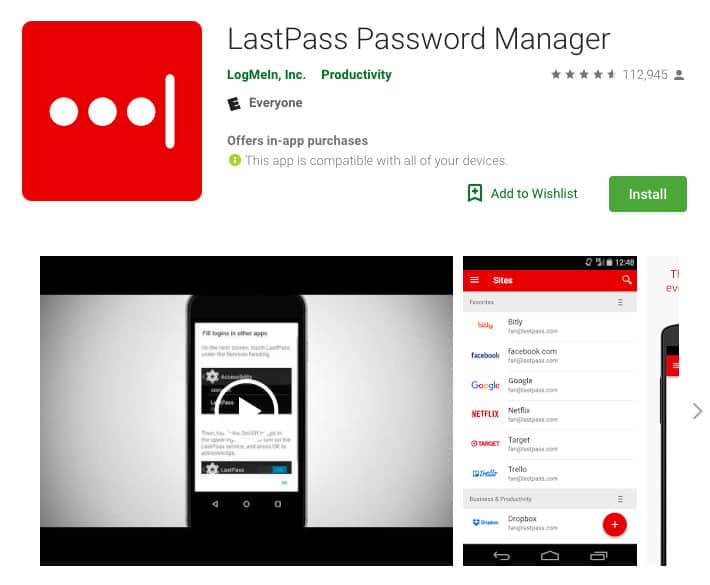
LastPass doubles up as a password manager and generator that stores your personal information, credit card info, and PIN codes in a secure vault. It can even be set up to automatically change passwords for select sites from time to time. Most importantly, it supports two-factor authentication, making it extremely difficult for anyone else to access your vault.
LastPass has its own app for Android phones and is available on the Google Play Store.
8. Find My Device
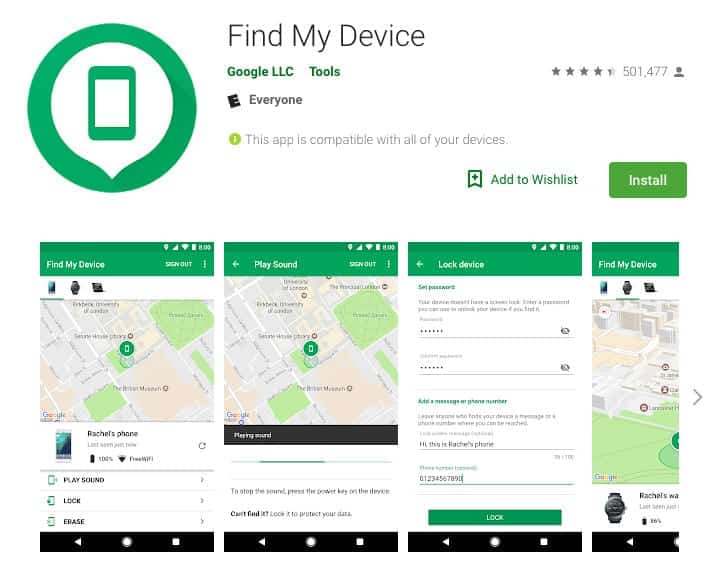
If the phone is lost, you can use the app to leave a callback number on the screen. So if a good samaritan comes across it, they’ll have no trouble returning it to you. Best of all, this service is completely free to use and can be accessed through the web as well as the app.
Download Find My Device for Android.
9. Norton Security and Antivirus
Did you know that there are antivirus apps for Android phones? These don’t just protect you from cyber threats like phishing, but can also provide an extra layer of security by removing malware and spyware that’ll potentially lock you out of your phone in the future.
Norton’s a well-known name in the antivirus industry, and its Android app comes packed with many great features. Besides routinely scanning your device, it also enables users to block unwanted calls and text messages, remotely lock devices, and locate the device on a map if lost or stolen. Best of all, this app has minimal impact on your battery life.
Download Norton Security and Antivirus from the Google Play Store.
10. Smart AppLock
Swipe patterns and numeric PIN codes only serve to lock the front screen of our phones. After that, individual apps and folders can be accessed with a tap of a finger. That’s not great for security or practicality. For example, you might need to hand your phone to someone to view a document but would feel uncomfortable with them sifting through personal data. Or you might allow your kids to play games on your phone but don’t want them accessing certain applications.
App locks enable you to alter permission settings for individual apps on your phone. This means a third party can’t open your WhatsApp, Facebook, or Twitter apps unless they input another password.
Download Smart AppLock from the Google Play Store.
How else can I protect my privacy on Android?
There are thousands of privacy apps that work on Android phones, and we obviously can’t cover all of them. However, there are a few quick, easy, and free ways to shield your online activity while using a mobile device. Here are a few of them:
- Switch to Firefox. The Android version lets you install extensions that block ads, protect against browser fingerprinting, and reject cookies automatically
- Use two-factor authentication whenever possible: 2FA ensures that attackers can’t just crack one weak password and access your account.
- Consider privacy-enhancing alternatives: There are plenty of private search engines, messaging apps, and secure browsing tools for Android phones. For instance, you may want to try out the Tor Browser, Qwant, or Telegram.
- Educate yourself: Learning the basics of cybersecurity can help you avoid most cyber threats and keep your online activity secure.
Best Android apps to protect privacy: FAQs
Why is protecting my privacy online so important?
You might be surprised just how much of your personal information hackers and snoopers are able to access. The risk is that failing to protect your data may result in identity theft, online fraud, or misuse of your data. Needless to say, no one wants the stress that comes with such attacks. However, you can prevent yourself from having to contend with this by protecting your privacy online through the best Android apps, such as NordVPN, Signal, and Proton Mail.
Is it legal to use a VPN on Android?
For the most part, you don’t need to worry about the legality of using a VPN or any of the other apps on our list. It’s perfectly legal to use a VPN on Android or, indeed, any other operating system. What’s more, VPNs are legal in nearly every country. However, some countries, such as China and Russia, have cracked down on their use. As long as your online activity while using a VPN remains legal, you’re highly unlikely to encounter any issues.
Disclaimer: Although we’ve spent hours researching this topic, we are not legal experts. As such, nothing we’ve said above should be taken as legal advice. We encourage you to consult local laws or perhaps even seek a professional’s opinion before attempting to use a VPN if you’re not sure it’s legal.
Why should I avoid free Android VPNs?
Free VPNs on the Play Store are often unsafe and may contain malicious code that can infect your device. Not only that, but they tend to have low monthly bandwidth limits, slow speeds, and poor streaming ability.

